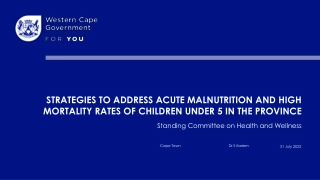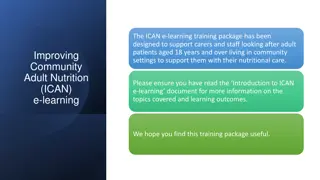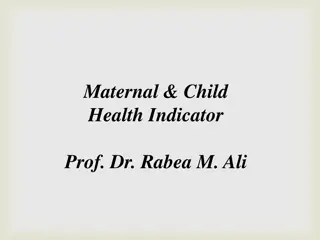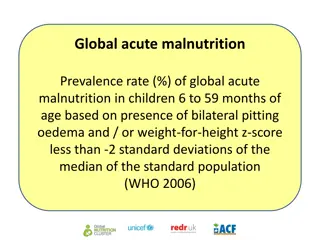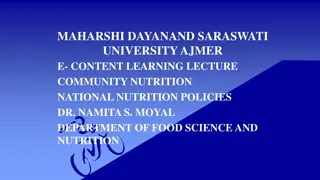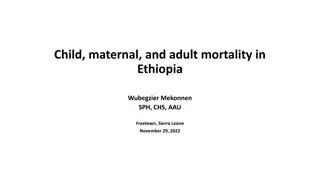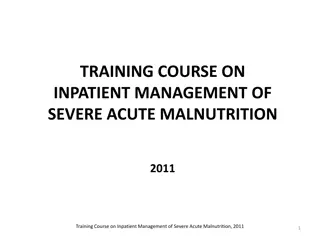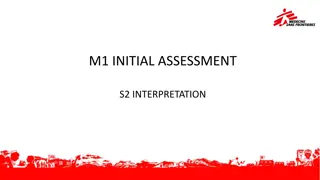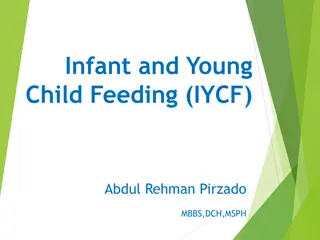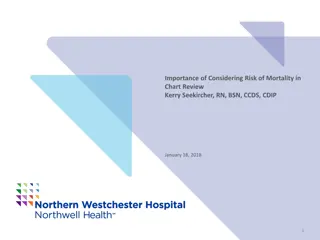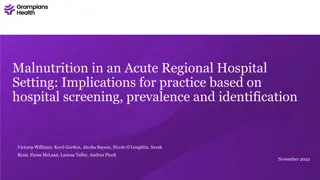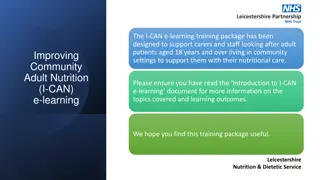Addressing Acute Malnutrition and High Child Mortality in Western Cape: Community Development Strategies
Update on the strategies implemented by the Chief Directorate to combat acute malnutrition and high mortality rates among children under 5 in the Western Cape. The Sustainable Livelihoods Programme focuses on social inclusion and poverty alleviation through targeted feeding and access to government services. Implementing partners like CNDCs and CBOs play a crucial role in providing nutritious meals and food relief to vulnerable populations.
Download Presentation

Please find below an Image/Link to download the presentation.
The content on the website is provided AS IS for your information and personal use only. It may not be sold, licensed, or shared on other websites without obtaining consent from the author. Download presentation by click this link. If you encounter any issues during the download, it is possible that the publisher has removed the file from their server.
E N D
Presentation Transcript
Briefing to the Standing Committee on Health and Wellness Acute malnutrition and the high mortality rate of children under 5 in the Western Cape Department of Social Development Chief Directorate: Community & Partnership Development 21 July 2023
Presentation outline 1. Purpose 2. Sustainable Livelihoods Programme: Purpose and Strategic Objective 3. Sustainable Livelihoods Programme implementing partners 4. CNDC and CBOs regional funding allocation 2023/24 financial year 5. Mitigating strategic responses to acute malnutrition and mortality rate in children under 5 6. Provision of nutritious meals at CNDCs and CBOs 7. Food gardens at CNDCs as a sustainable mitigating response to acute malnutrition and mortality 8. Food parcel distribution to vulnerable households
Purpose To provide an update on the contribution made by the Chief Directorate: Community & Partnership Development with strategies to address acute malnutrition and the high mortality rate of children under 5 in the Western Cape Province.
Sustainable Livelihoods Programme: Purpose and Strategic Objective Programme Purpose: To promote social inclusion and poverty alleviation through temporary targeted feeding for the most vulnerable as well as providing them with opportunities to access appropriate government services. Strategic objective: Manage Social Facilitation and Poverty for Sustainable Livelihood programmes (including EPWP).
Sustainable Livelihoods Programme implementing partners The programme partners with Non- Profit Organisations to ensure implementation and achievement of its strategic goals. It does this by providing funding , i.e., Community Nutrition and Development Centres (CNDC) and Community Based Kitchens (CBOs) otherwise known as soup kitchens. CNDCs provides food relief to registered beneficiaries 5 days a week, reaching more than 10,000 beneficiaries per month. Community Based Kitchens provides food relief services to beneficiaries 3 to 4 days a week, reaching more than 85,000 beneficiaries per month. 1,133,300 number of cooked meals have been provided to vulnerable individuals during 2019/20 to date 80% of these beneficiaries are women with children mostly under the age of 5 (Source: Sustainable Livelihoods beneficiary registers from feeding sites)
CNDC and CBOs regional funding allocation 2023/24 financial year Region Allocation Cape Winelands/ Overberg R6,432,056.00 Eden Karoo R11,339,462.30 Metro East R2,564,867.80 Metro North R8,255,440.30 Metro South R18,242,350.20 West Coast R4,738,216.30 Total R51,572,392.90
Mitigating strategic responses to acute malnutrition and mortality rate in children under 5 It has long been established globally that there is a strong correlation between food insecurity and child malnutrition and child mortality in the children under 5 years of age (Source: World Bank Report on infant and child mortality, 2021) The communities of the Western Cape have not been spared from this reality. While the DSD programme is mostly targeted at adult beneficiaries , it recognizes the complex dynamics of poverty in which the beneficiaries find themselves.
Mitigating strategic responses to acute malnutrition and mortality rate in children under 5 (cont.) The most glaring complexity being the one of single parent households, mostly headed by women with young children. In recognition of the need, and to reduce vulnerability in these households , the Department ensures the provision of food relief services to children of beneficiaries within this age category as a mitigating responses to acute malnutrition and child mortality.
Provision of nutritious meals at CNDCs and CBOs Vulnerable mothers and their children are provided with nutritious meals at CNDCs, which are located in close proximity to their homes thus ensuring ease of access to food. A meal is provided to each beneficiary (mother and child) 5 days a week to ensure consistent and regular access to food. A profile/data of beneficiaries is compiled and kept at CNDCs to ensure tracking of these beneficiaries to ensure that children receiving meals at CNDCs are retained in the system.
Provision of nutritious meals at CNDCs and CBOs (cont.) Prevention of harmful food related diseases and poisoning: Meals at CNDCs are quality assured in partnership with the Department of Health by creating a prescribed and standardized meal plan. This is done to address food standards and ensuring that the nutritional value of the meal is upheld for positive child development outcomes. The department ensures regular monitoring of compliance to Norms and Standards in terms of prescribed Occupational Health and Safety standards of kitchens across feeding centres. This is done so as to prevent harmful food related diseases and poisoning which could contribute child mortality.
Food gardens at CNDCs as a sustainable mitigating response to acute malnutrition and mortality Community Food Gardens This is a new initiative piloted by DSD and supported by the Department of Agriculture to move CNDC beneficiaries from dependency to self-reliance. Community Gardens are also supported and implemented by selected CNDCs across the Western Cape. This is done to create some level of self reliance for the CNDC beneficiaries whereby they are able to sell their surplus produce to the market. Awareness and training is provided by partner organisations to the communities and beneficiaries. The intension is to encourage beneficiaries to start their own gardens and become more self-reliant.
Food gardens at CNDCs as a sustainable mitigating response to acute malnutrition and mortality (cont.) Household Food Gardens: Household Food Gardens are also supported at suitable CNDCs by encouraging beneficiaries to start their Household Food Gardens at their backyards This intervention is done to enable beneficiaries to start their own projects and plant their own food gardens and grow vegetables towards making their own nutritious meals The two interventions above are supported by the Western Cape Department of Agriculture and the National Department of Agriculture, Land Affairs and Rural Development. .
Food parcel distribution to vulnerable households The Western Cape DSD provided 95,920 food parcels targeting individuals and households who needed food since 2020 as part of the COVID response to minimize vulnerability in communities, especially women and children. Food parcels are targeting individuals/ households who have no means due to unemployment and difficulty economic conditions. Individuals in need of food parcels make a request to DSD. The relevant local office of DSD assesses eligibility and make a recommendation for the allocation of a food parcels to qualifying beneficiaries. DSD then allocates the food parcels to the clients.
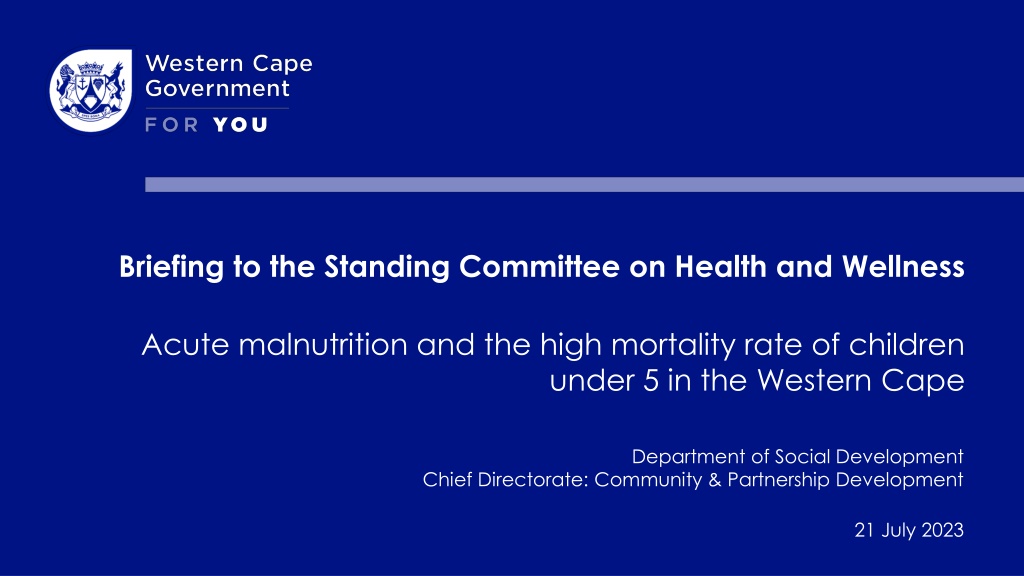
 undefined
undefined



